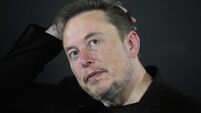If Elon Musk is ever told to stop doing what he’s doing, will he comply?

South African born businessman Elon Musk is currently worth in the region of €240bn (€215bn). File picture: Patrick Pleul/ AP
It's very hard to live in today’s world and not know who Elon Musk is.
If not the world’s richest man at all times, he’s generally in the conversation, currently worth in the region of €240bn (€215bn).














